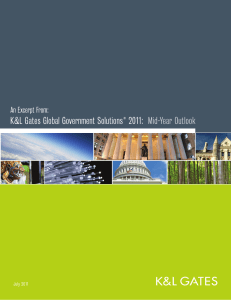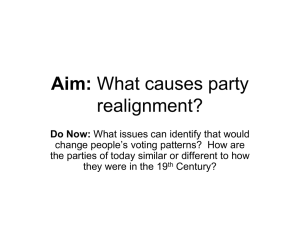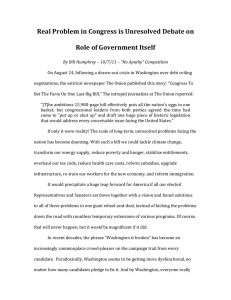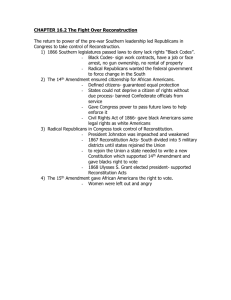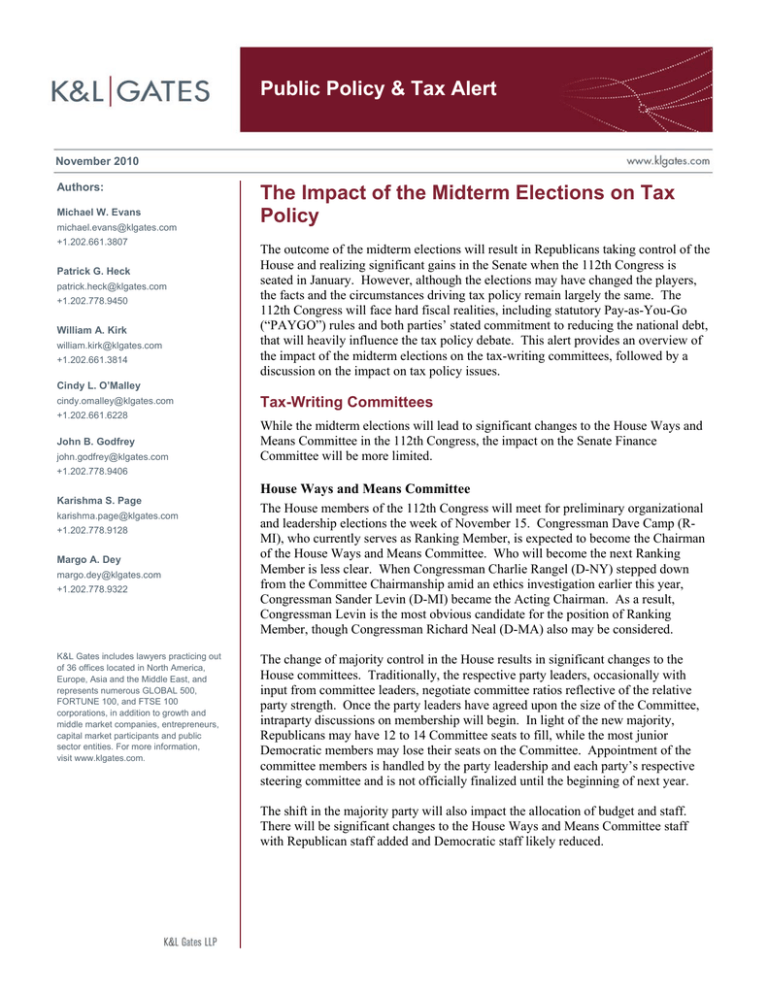
Public Policy & Tax Alert
November 2010
Authors:
Michael W. Evans
michael.evans@klgates.com
+1.202.661.3807
Patrick G. Heck
patrick.heck@klgates.com
+1.202.778.9450
William A. Kirk
william.kirk@klgates.com
+1.202.661.3814
The Impact of the Midterm Elections on Tax
Policy
The outcome of the midterm elections will result in Republicans taking control of the
House and realizing significant gains in the Senate when the 112th Congress is
seated in January. However, although the elections may have changed the players,
the facts and the circumstances driving tax policy remain largely the same. The
112th Congress will face hard fiscal realities, including statutory Pay-as-You-Go
(“PAYGO”) rules and both parties’ stated commitment to reducing the national debt,
that will heavily influence the tax policy debate. This alert provides an overview of
the impact of the midterm elections on the tax-writing committees, followed by a
discussion on the impact on tax policy issues.
Cindy L. O’Malley
cindy.omalley@klgates.com
Tax-Writing Committees
+1.202.661.6228
John B. Godfrey
john.godfrey@klgates.com
While the midterm elections will lead to significant changes to the House Ways and
Means Committee in the 112th Congress, the impact on the Senate Finance
Committee will be more limited.
+1.202.778.9406
Karishma S. Page
karishma.page@klgates.com
+1.202.778.9128
Margo A. Dey
margo.dey@klgates.com
+1.202.778.9322
K&L Gates includes lawyers practicing out
of 36 offices located in North America,
Europe, Asia and the Middle East, and
represents numerous GLOBAL 500,
FORTUNE 100, and FTSE 100
corporations, in addition to growth and
middle market companies, entrepreneurs,
capital market participants and public
sector entities. For more information,
visit www.klgates.com.
House Ways and Means Committee
The House members of the 112th Congress will meet for preliminary organizational
and leadership elections the week of November 15. Congressman Dave Camp (RMI), who currently serves as Ranking Member, is expected to become the Chairman
of the House Ways and Means Committee. Who will become the next Ranking
Member is less clear. When Congressman Charlie Rangel (D-NY) stepped down
from the Committee Chairmanship amid an ethics investigation earlier this year,
Congressman Sander Levin (D-MI) became the Acting Chairman. As a result,
Congressman Levin is the most obvious candidate for the position of Ranking
Member, though Congressman Richard Neal (D-MA) also may be considered.
The change of majority control in the House results in significant changes to the
House committees. Traditionally, the respective party leaders, occasionally with
input from committee leaders, negotiate committee ratios reflective of the relative
party strength. Once the party leaders have agreed upon the size of the Committee,
intraparty discussions on membership will begin. In light of the new majority,
Republicans may have 12 to 14 Committee seats to fill, while the most junior
Democratic members may lose their seats on the Committee. Appointment of the
committee members is handled by the party leadership and each party’s respective
steering committee and is not officially finalized until the beginning of next year.
The shift in the majority party will also impact the allocation of budget and staff.
There will be significant changes to the House Ways and Means Committee staff
with Republican staff added and Democratic staff likely reduced.
Public Policy & Tax Alert
Senate Finance Committee
Both Republicans and Democrats have scheduled
tentative Leadership and Committee Chair elections
the week of November 15. Senator Max Baucus (DMT) is expected to remain Chairman of the Senate
Finance Committee. Senator Chuck Grassley (RIA), however, will vacate his position as Ranking
Member to become the lead Republican on the
Senate Judiciary Committee. Senator Orrin Hatch
(R-UT) is his successor on the Finance Committee.
Any changes to the Committee’s size and ratio will
be determined by interparty negotiations between
Majority Leader Harry Reid (D-NV) and Minority
Leader Mitch McConnell (R-KY). Historically,
ratios in the Committee have mirrored the ratios in
the overall chamber. The gap between Democrats
and Republicans will likely narrow following the
elections, given the near-split in the chamber
between Republicans and Democrats. One possible
scenario is that the ratio of Democrats to
Republicans on the Committee becomes 12:11. In
terms of Committee composition, once Majority
Leader Reid and Minority Leader McConnell have
agreed upon the size of the Committee, intra-party
discussions on membership will begin. The final
Committee roster may not be determined until late
January or early February. As in the House,
Republicans and Democrats have different
approaches to committee selection.
In regard to Committee resources, unlike the House,
neither party will experience a dramatic cut in
Committee staff or resources. The Committee
budget will reflect the party ratio, so given the
almost even divide between Republicans and
Democrats, both parties will have comparable
resources.
Despite the continuity in the Committee, its
dynamics may change. Current Ranking Member
Grassley is known for his moderate stances and
willingness to negotiate with Chairman Max Baucus.
His anticipated successor, Senator Hatch, may likely
be less open to compromise because he represents a
more conservative state and is likely looking ahead
to a tough re-election campaign in 2012.
Additionally, seven Democrats and four Republicans
on the Committee are up for re-election in 2012.
Consequently, these members may view any
decisions on the Committee through the prism of the
2012 elections.
Tax Policy Issues
Although these significant Republican gains in the
midterm elections will impact the tone of the tax
policy debate, the fundamentals driving Congress’
tax and fiscal agendas remain the same. For
example, the new Congress will still have to abide
by the statutory PAYGO regime established earlier
this year. Additionally, whatever tax priorities are
not accomplished during Lame Duck will take
immediate precedence when the 112th Congress
convenes this January. This section provides a brief
summary of these pending tax issues and concludes
with an analysis of how the midterm elections will
impact tax policy more broadly in the 112th
Congress, including the prospects for
comprehensive tax reform.
PAYGO
The recently enacted statutory PAYGO Act of 2010
requires that revenue cuts or spending increases be
offset. Failure to offset these costs can result in a
“sequester”—an across-the-board spending cut to
certain federal programs. However, while PAYGO
generally requires tax policies to be offset, it also
exempts certain programs, in some respects
providing Congress with a roadmap to addressing
tax policy. Under PAYGO, Congress does not need
to offset the cost of: (1) a permanent extension of
2001/2003 tax cuts for taxpayers earning under
$200K ($250K for joint filers); (2) a 2-year
extension of the estate tax at 2009 levels; (3) a 2year extension of AMT patch; and (4) a 5-year
extension of Medicare’s “doc-fix.”
However, legislation providing these extensions
must be enacted before 2012 to qualify for the
PAYGO exemption. As noted above, these
PAYGO exemptions provide something of a policy
roadmap, with lawmakers more likely to address
these items than other tax provisions that will
require offsets. It is also possible that these exempt
items may be addressed as part of an omnibus tax
package, along with a few other key, “must pass”
tax items. These items for which offsets must be
provided include: (1) retroactively extending
expired tax provisions through 2010 (so-called “tax
extenders”); (2) extending 2010 expiring tax
November 2010
2
Public Policy & Tax Alert
provisions through 2011; (3) extending the
2001/2003 tax cuts, temporarily or permanently, for
higher-income taxpayers; (4) creating a 20%
dividends rate for higher-income taxpayers; (5) any
extension or expansion of the estate tax beyond a
two-year extension at 2009 levels; and (6) any AMT
patch beyond 2011.
Lame Duck
When Congress returns for its Lame Duck session, it
faces a laundry list of tax priorities and very little
time to make progress on them. Congress is
tentatively scheduled to return for a Lame Duck
session November 15-20, at which point it adjourns
for a one-week, Thanksgiving holiday. Following
Thanksgiving, the Senate is tentatively scheduled to
return the week of November 29. The House has not
yet settled its Lame Duck schedule. Because the
first week Congress returns in November will be
devoted to leadership and committee selections, it is
unlikely that any substantive tax policy will be
addressed. Consequently, it is likely that Congress
will not begin to seriously focus on tax items until
early December, leaving approximately three weeks
to resolve a host of outstanding tax policies.
There are three major drivers that will put significant
pressure on Congress to address some tax issues
before the end of the year. First, if Congress does
not address the 2001/2003 tax cuts, the withholding
tables will revert to pre-2001/2003 levels beginning
on January 1, 2011, meaning that taxpayers’ takehome pay would immediately decrease as a result of
the additional withholding. Second, if Congress
does not extend the AMT “patch,” more than twenty
million taxpayers will unexpectedly owe alternative
minimum tax payments. Third, in the case of
Congressional inaction, the estate tax will revert to
pre-2001 levels, with a $1 million exemption and a
top rate of 55%.
The extent to which Congress makes progress on its
long list of tax “to-dos” during Lame Duck largely
depends on lawmakers’ willingness to compromise
immediately following the elections. Republicans,
energized by the elections, will continue to advocate
for a permanent extension of the 2001/2003 tax cuts
for all taxpayers. In contrast, many Democrats will
continue to align themselves with the
Administration, arguing that the 2001/2003 tax cuts
should only be extended for the middle class. Since
neither party will have the votes to enact its
preferred policy, a compromise will have to be
reached.
It appears that members are beginning to coalesce
around a path forward. Republicans and Democrats
may agree on a package including a temporary
extension of the 2001/2003 tax cuts for all
taxpayers, along with other tax items, such as “tax
extenders” and the AMT patch. As noted above,
some of these items must be paid for under
PAYGO, though Congress may waive PAYGO’s
requirements as it has done in the past. However, if
members are unable to come to an agreement, these
issues will likely be addressed in the first quarter of
2011.
Tax Policy in the 112th Congress
The combination of statutory PAYGO along with
both parties’ stated commitment to reducing the
national debt creates an uncertain tax environment
for businesses in the 112th Congress. Bound by
PAYGO, Congress may continue to aggressively
search for revenue.
As a general matter, Republicans will prefer using
spending cuts, rather than tax increases, to finance
legislation and reduce the deficit. However, the
reality of the nation’s fiscal situation—a $13.6
trillion national debt and federal revenues at their
lowest share of GDP since 1950—ensures that tax
increases will remain on the table. For their part,
Democrats will continue to favor financing
legislation through closing so-called “tax
loopholes,” or other disguised tax increases, rather
than spending cuts. Democrats will likely choose
from the menu of revenue options outlined in the
President’s FY 2011 budget. Republicans may be
more amenable to raising revenue by eliminating
“tax expenditures” or preferential provisions in the
tax code, such as tax credits, deductions, and
exemptions.
Deficit Commission
The President’s National Commission on Fiscal
Responsibility and Reform is scheduled to release
its report containing recommendations to place the
country on a path toward long-term fiscal
sustainability on December 1, 2010. At this point, it
is uncertain whether the Commission, comprised of
November 2010
3
Public Policy & Tax Alert
ten Democrats and eight Republicans, will be able to
reach the agreement necessary to release an official
Commission report. However, if the Commission
does issue a report, its recommendations may
significantly influence how Congress addresses tax
and fiscal issues going forward. Moreover, the
Administration may consider the Commission’s
recommendations for inclusion in the President’s FY
2012 budget submission due in February, increasing
the chances that any given proposal is considered by
Congress.
Economic Stimulus
Although Republicans are likely to object strongly to
any additional spending to stimulate the economy,
there may be grounds for a compromise on tax cuts
to stimulate the economy (beyond extensions of the
2001/2003 tax cuts). For example, President Obama
has called for further tax cuts, primarily in the form
of expensing; incoming Ways and Means
Committee Chairman Camp has called for a
deduction for small businesses; and there have been
recent proposals for a new round of “repatriation,”
under which overseas income is allowed to be
repatriated to U.S. parent companies at low tax
rates.
Comprehensive Tax Reform
With respect to comprehensive tax reform, there
also may be grounds for a compromise. Several
senior Republicans have called for a combination of
lower corporate tax rates and a broader corporate
tax base. Earlier this year, the Senate Finance
Committee held the first of what Chairman Baucus
said would be a series of hearings on tax reform.
Given the budget deficit, a tax reform proposal
probably cannot significantly reduce tax revenue,
which will require difficult trade-offs.
Anchorage Austin Beijing Berlin Boston Charlotte Chicago Dallas Dubai Fort Worth Frankfurt Harrisburg Hong Kong London
Los Angeles Miami Moscow Newark New York Orange County Palo Alto Paris Pittsburgh Portland Raleigh Research Triangle Park
San Diego San Francisco Seattle Shanghai Singapore Spokane/Coeur d’Alene Taipei Tokyo Warsaw
Washington, D.C.
K&L Gates includes lawyers practicing out of 36 offices located in North America, Europe, Asia and the Middle East, and represents numerous
GLOBAL 500, FORTUNE 100, and FTSE 100 corporations, in addition to growth and middle market companies, entrepreneurs, capital market
participants and public sector entities. For more information, visit www.klgates.com.
K&L Gates comprises multiple affiliated entities: a limited liability partnership with the full name K&L Gates LLP qualified in Delaware and
maintaining offices throughout the United States, in Berlin and Frankfurt, Germany, in Beijing (K&L Gates LLP Beijing Representative Office), in
Dubai, U.A.E., in Shanghai (K&L Gates LLP Shanghai Representative Office), in Tokyo, and in Singapore; a limited liability partnership (also named
K&L Gates LLP) incorporated in England and maintaining offices in London and Paris; a Taiwan general partnership (K&L Gates) maintaining an
office in Taipei; a Hong Kong general partnership (K&L Gates, Solicitors) maintaining an office in Hong Kong; a Polish limited partnership (K&L
Gates Jamka sp.k.) maintaining an office in Warsaw; and a Delaware limited liability company (K&L Gates Holdings, LLC) maintaining an office in
Moscow. K&L Gates maintains appropriate registrations in the jurisdictions in which its offices are located. A list of the partners or members in each
entity is available for inspection at any K&L Gates office.
This publication is for informational purposes and does not contain or convey legal advice. The information herein should not be used or relied upon
in regard to any particular facts or circumstances without first consulting a lawyer.
©2010 K&L Gates LLP. All Rights Reserved.
November 2010
4


